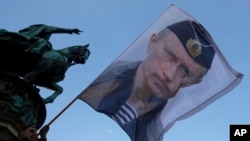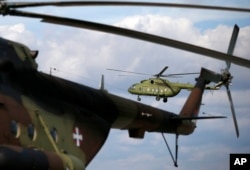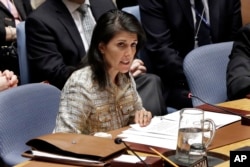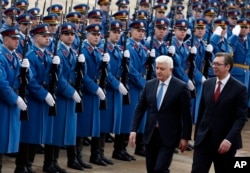Serbia's outgoing prime minister, Aleksandar Vucic, reassured European Union officials visiting Belgrade on Wednesday that his country remains committed to joining the European bloc — but he cautioned that Serbs also want to pursue traditional ties with "friends from the East."
And in recent months, those friends in the Kremlin have been busy, say Western officials and analysts.
From offering help with disaster relief to supplying sophisticated weaponry, including warplanes, the Kremlin is seeking to expand its influence in the Balkans, a region Moscow has viewed historically as in its sphere of influence, they warn.
Moscow's diplomatic offensive apparently is paying off. A recent Gallup poll suggests a majority of Serbs views Russia as a more dependable ally than NATO, an organization Belgrade officially wants to join.
"Serbia is on its European path, because we think that we belong to this type of society; we would like to join the countries who believe in democracy, entrepreneurship, human rights," Vucic told the European officials.
He warned, though, that ordinary Serbs "often see the EU as a machine for pressure over Kosovo," a reference to the as-yet-unresolved status of the onetime Serbian province, which declared formal independence in 2008.
Serbia has withheld recognition of Kosovo — as has Russia.
Many Serbs frowned on former U.S. Secretary of State Hillary Clinton and cheered President Donald Trump's election, a reflection of their residual anger over NATO's bombing of Serbia in 1995 and 1999 during the Balkans War ordered by her husband, then-President Bill Clinton. They had hoped the new U.S. president would change course on U.S.-Balkans policy and favor Belgrade in the unresolved dispute over Kosovo's status.
American officials, though, have dashed Serbian hopes with recent statements indicating Washington's support for Kosovo will remain unwavering during the Trump presidency.
Those statements included a call by the new U.S. ambassador to the United Nations, Nikki Haley, for the breakaway province to become a full member of the U.N.
"In Kosovo, while more must be done to strengthen governance and the rule of law, the United States believes that the international community must recognize Kosovo's great strides since independence," Haley said February 21 at the U.N. Security Council.
Heightened tensions
Kosovo's status is just one issue dividing the Balkans. Others include whether to tilt geopolitically to the East or West, and border disputes. Ethnic tensions are on the rise in Serbia, Bosnia-Herzegovina and Montenegro. Bosnia remains split among Serbs, Bosnians and Croats, and the wounds of the vicious three-year-long war of the 1990s have not yet begun to heal.
All the issues are adding to tensions in the Balkans just as the region turns into a political battleground between a revanchist Russia and an uncertain West, say pro-West Balkan politicians.
Last week, neighboring Montenegro's former prime minister accused Russia of "destructive" politics in the Balkans. His comments came in the wake of startling allegations by Montenegro officials that the Kremlin was behind an attempt in October to overthrow the country's pro-Western government.
Milo Djukanovic, who resigned after the alleged pro-Russian plot, told Socialist Democratic Party members that Montenegro is now in the firing line of a newly assertive Russia eager to expand its influence in the Balkans. Pro-Russian opposition parties were ready to use "bloodshed and a coup" to install a pro-Kremlin government, he said.
The Kremlin has denied the allegations of Russian involvement in an election day plot that allegedly included plans to kill Djukanovic and take over the country's parliament. Prosecutors have accused some 20 people — including two Russians — of involvement.
Russian officials have recently said Serbia, Bosnia, Macedonia and Montenegro should be seen as in Moscow's sphere of interest and are opposed to any of them joining NATO. As with other parts of Europe, the Kremlin has been supporting openly anti-EU nationalist parties in the Balkans.
Russian 'autocracy'
In Serbia, analysts say a clear illustration of the Kremlin's efforts to expand its clout can be seen in the growing role Russian media are playing in the country.
In May, a report by the Center for Euro-Atlantic Studies, a pro-Western Belgrade-based policy research organization, found that 109 registered non-governmental organizations, associations and media outlets can be linked to pro-Russian lobbying efforts.
The increase in Russian media activity, according to the research group, started in 2008 in Serb areas of northern Kosovo, and increased dramatically in 2012, coinciding with pro-Serb demonstrations and the start of negotiations on the normalization of relations between Serb and Kosovo authorities under the auspices of the EU.
Pro-Russian advocacy "increased drastically in 2015 when it became clear that Serbia would begin formal negotiations with the EU, and when the intention of stronger cooperation with NATO within the Individual Partnership Action Plan [IPAP] was disclosed," according to the authors of the study, Eyes Wide Shut.
"The replacement of democracy with autocracy, under the current Russian model, is the main goal of Russian soft power in Serbia and in the region. Other goals are the reduction of support for European integration and the discrediting of the very concept of [EU] enlargement," the research group's authors assert.
There also has been a noticeable increase in the influx of content sponsored by state-run Russia media outlets, such as Russia Today and Sputnik, offered for free to cash-strapped Serbian media outlets.
With elections due this year in Serbia, and the first indictments expected from an international court established in The Hague for trials of alleged historical war crimes committed during the 1990s by the ethnic Albanian Kosovo Liberation Army, tensions are likely only to increase in the Balkans.















